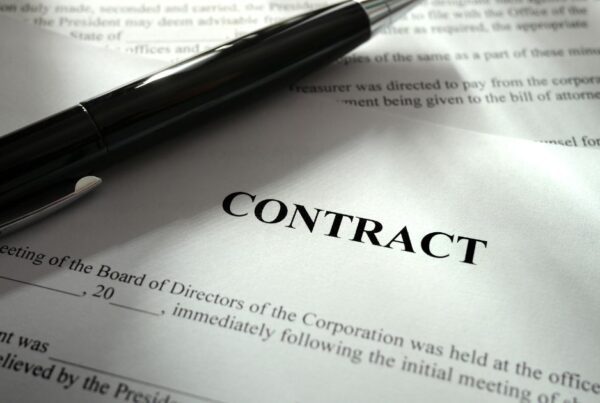 If you’re looking to buy or sell commercial real estate in Florida, you need to understand something that doesn’t always get talked about upfront: deed restrictions.
If you’re looking to buy or sell commercial real estate in Florida, you need to understand something that doesn’t always get talked about upfront: deed restrictions.
Deed restrictions, also called “restrictive covenants,” can significantly limit what you can do with a piece of commercial property, even after the sale is finalized. Whether you’re an investor, business owner, or developer, failing to account for these restrictions could lead to major legal or financial headaches later on.
At Ayala Law, we work with buyers and sellers across Florida to ensure their commercial transactions are legally sound and strategically protected. Here’s what you need to know about deed restrictions before you sign on the dotted line.
What Is a Deed Restriction in Commercial Real Estate?
A deed restriction is a private agreement written into the deed of a property that limits how the property can be used, even after it’s sold. These restrictions are legally binding and “run with the land,” meaning they apply to future owners as well.
In commercial real estate, deed restrictions can control things like:
-
What types of businesses can operate on the property
-
Building height or square footage
-
Parking availability
-
Types of signage allowed
-
Hours of operation
-
Environmental limitations (e.g., no gas stations or dry cleaners)
These restrictions are not imposed by the government, they’re created by developers, prior owners, or sometimes homeowners or business associations to protect property values or ensure consistency within a development.
Why Are Deed Restrictions Important for Commercial Property Buyers?
Failing to review or understand a deed restriction before purchasing a commercial property can result in:
-
Not being able to operate your intended business
-
Delays in development plans
-
Breach of contract claims or lawsuits
-
Decreased property value or resale difficulty
We’ve seen clients buy properties assuming they could open a restaurant or bar, only to discover that a deed restriction prohibits food service businesses altogether.
How to Find Out if a Commercial Property Has a Deed Restriction
Here are steps you or your attorney should take:
1. Review the Chain of Title
The deed restriction will typically appear in the title documents or be recorded in the public records. A title search will reveal if any covenants or restrictions have been recorded against the property.
2. Examine the Property’s Declaration or Master Plan
If the commercial property is part of a larger development (like a retail plaza or business park), check the declaration of covenants and restrictions. These often spell out usage limitations.
3. Consult with a Real Estate Attorney
An experienced attorney can interpret vague or outdated restrictions and explain how they could impact your business. Sometimes, the language in these documents is technical, and you may not realize how limiting it is until it’s too late.
Can Deed Restrictions Be Removed or Changed?
The short answer: sometimes—but not easily.
Modifying or removing a deed restriction depends on:
-
Who created the restriction and whether they still have authority over it
-
Whether the restriction had a termination date or automatic expiration
-
If all affected parties (such as other property owners or associations) agree to the change
-
Whether the restriction violates public policy or zoning laws
You’ll often need unanimous consent from other owners in the development or formal legal action. This is why understanding the restriction upfront is critical.
Common Pitfalls When Overlooking Deed Restrictions in Commercial Sales
Here are a few real-world examples of how deed restrictions can cause issues:
-
A buyer purchases a strip mall unit to open a medical clinic but later discovers the development restricts all medical uses.
-
A franchisee plans to open a fast-food location but finds the deed prohibits “any use that emits cooking odors.”
-
A developer closes on land for a mixed-use building, only to learn a prior owner imposed a height restriction that makes the plan unfeasible.
In each of these cases, early legal review could have prevented costly mistakes.
How a Lawyer Can Help with Deed Restrictions in Commercial Transactions
Whether you’re a buyer or seller, a real estate attorney plays a critical role in protecting your interests:
-
Buyers need legal due diligence to ensure the property suits their intended use
-
Sellers may need to disclose restrictions and ensure they don’t violate them when marketing the property
-
Both parties benefit from guidance on how deed restrictions affect value, risk, and legal compliance
At Ayala Law PA, our team reviews commercial deeds, drafts and negotiates sale contracts, and represents clients in litigation over real estate disputes—including conflicts over deed restrictions.
Questions to Ask Before Closing a Commercial Real Estate Deal
If you’re currently evaluating a commercial property, ask these before moving forward:
-
Are there any recorded deed restrictions or covenants?
-
Do these restrictions limit the type of business I plan to operate?
-
Who has the authority to enforce or modify these restrictions?
-
Could these restrictions impact future buyers or tenants?
-
Is there a process to challenge or remove the restriction?
Final Thoughts: Deed Restrictions Are Manageable—If You Catch Them Early
Deed restrictions don’t have to derail your commercial property deal, but they do require early attention and clear legal guidance. The best time to review these restrictions is before you sign a contract, not after.
If you’re buying, selling, or developing commercial property in Florida, contact an experienced attorney in Miami at 305-570-2208.
You can also contact attorney Eduardo A. Maura at eduardo@ayalalawpa.com.
Schedule a case evaluation online here.
[The opinions in this blog are not intended to be legal advice. You should consult with an attorney about the particulars of your case].
Subscribe to Our Blog
Stay informed with our latest blog posts delivered directly to your inbox. Gain valuable legal insights, tips, and advice from our seasoned attorneys.







